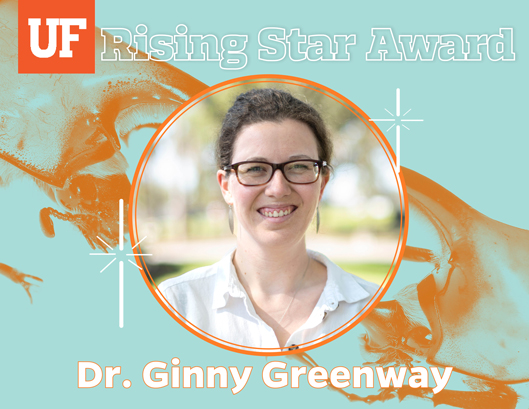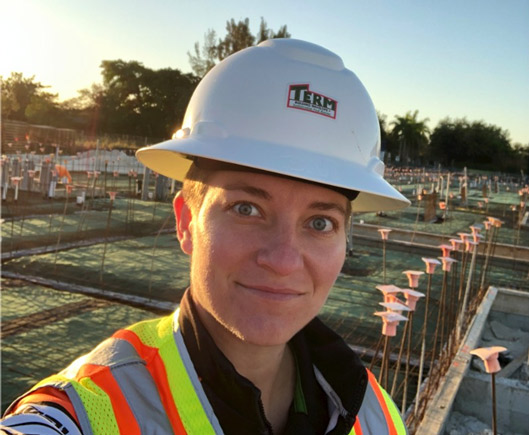- Faculty News
- Student News
- Lab News
- Publications
- Meetings and Presentations
- Outreach
- Grants
- Announcements
- About This Newsletter

ABOVE: Plagiolepis alluaudi interacting with mealybugs on a hibiscus plant. Photo by T. Chouvenc.
Dr. Eva Buckner, assistant professor at FMEL, was interviewed on mosquitoes and COVID-19 virus for two news stories: the first news story aired on April 10th. https://www.fox13news.com/news/no-mosquitoes-cannot-spread-covid-19 and the second aired on April 15th https://www.accuweather.com/en/videos/mosquitoes-are-no-threat-to-transmit-covid-19/DEfiUe10.

Dr. Billy Crow has recently been featured in two podcasts: The Joe Gardener Show “Understanding nematodes: Microscopic worms, friend or foe of your garden”, and TurPh.Dudes “Nematode control research and management with Dr. Crow.”

Dr. Anthony Auletta and Dr. Rebecca Baldwin were each awarded the 2020 UF Global Learning Institute Designation on curriculum internationalization for global learning courses.

Dr. Ginny Greenway, a postdoc in the Miller Lab, has been awarded a 2020 'Rising Star Award' by the University of Florida's Center for Teaching Excellence. This is in recognition of her efforts to provide students with authentic research experiences through Course-based Undergraduate Research Experiences (CUREs) within the Entomology and Nematology Department, as well as via a campus-wide initiative in partnership with the Center for Undergraduate Research. Way to go Ginny!

The Honey Bee Research and Extension Lab recently wrote a FAQ about the Asian giant hornet. Access the document here.

Dr. Lawrence Reeves discovered a new moth species in the deserts near the US-Mexico border, and named it Cicinnus chambersi for Aaron Chambers of Tucson, AZ. Publication is listed in the Publication section.

ABOVE: Aaron Chambers, field biologist and friend of Dr. Reeves. He has a new species namesake.

Dr. Brett C. Ratcliffe of University of Nebraska and Dr. Ronald D. Cave from the Indian River Research & Education Center were recently awarded the Westwood Award by the Royal Entomological Society for their published volumes on the fauna and taxonomy of the dynastine scarab beetles (Coleoptera: Scarabaeidae) of Central America, North America, and the West Indies. They will be presented their medals at the next International Congress of Entomology. They received a cash award that will be used for production of new volumes on the South American fauna (The Dynastine Scarab Beetles of Ecuador is in press).

Dr. Thomas Chouvenc continues to document invasive species in his backyard during quarantine. He produced an educational video about Plagiolepis alluaudi, the little yellow ant, which is a recently introduced species in South Florida, He discussed the process of creating such material during a pandemic, on two separate articles, one Entomology Today, and one on Insectes Sociaux.

Dr. Bryony Bonning co-authored a manuscript with collaborators from University of Illinois and Iowa State University, that was published in the Proceedings of the National Academy of Sciences USA. The paper shows that Israeli acute paralysis virus alters honey bee behavior to minimize the spread of infection within hives - social distancing for honey bees with less mouth-to-mouth food sharing. However, virus-induced changes also include changes in smell (cuticular hydrocarbons) and behavior that facilitate virus spread to neighboring hives. This paper has been featured in numerous outlets including NPR’s Science Friday and Science magazine.
The Entomology and Nematology Undergraduate Students were well represented at the Virtual CALS Scholarship and Awards Ceremony. Please join us in congratulating each of these students. (Put your blue hands together for…)
CALS Top 10 Seniors – Kaylin Kleckner
2019-2020 CALS Club of the Year, advised by Dr. Rebecca Baldwin
The Entomology Club
Officers:
CALS 2019 Scholarship Recipients:
Also, please join us in congratulating the nominees for the GatorConnect Student Activities and Involvement recognition!
Nominees:


ABOVE: Holly Beard.
Editor's note: photo not from the Urban Augmentation Medical Task Force 332-1.

Leo Ohyama, PhD student working with Dr. Andrea Lucky, just published his last chapter from his master’s thesis (from the University of Central Florida) on subterranean ants in the journal Ecology. The co-authors include Joshua R. King, who obtained his PhD from UF Entomology in 2004. The paper has been picked up by Science Magazine and featured in an article with commentary by other ant ecologists, including Dr. Andrea Lucky. Nice work Leo! https://www.sciencemag.org/news/2020/05/thief-ants-steal-and-eat-young-other-ants-decimating-their-populations.
Need to name that bug? A host of experts are available to help Floridians identify any insect or related arthropod. If a mystery creature has six or more legs, the UF Insect ID Lab is the place to call.
The most popular topic of inquiries to the Insect ID Lab lately has been the Asian giant hornet, Vespa mandarinia, sensationalized by the media as the ‘murder hornet’. This hornet is native to Japan, Korea, and other countries in southeast Asia. It somehow got to the Pacific Northwest and was found in British Columbia and Washington State last fall. Because of recent social media activity, people are calling the Entomology & Nematology Dept. about possible sightings here in Florida. Chances are very slim that it will get to Florida anytime soon, and photos that have been sent so far have been of other native species of insects like southern yellowjacket queens and a large scoliid wasp, Pygodasis quadrimaculata. Interestingly, a couple of people have sent photos of hornet mimics, including the hornet clearwing moth, Paranthrene simulans, and the yellowjacket hover fly, Milesia virginiensis. Even large longhorned beetles can be mistaken for Asian giant hornets, as a couple people have sent Lyle photos of the hardwood stump borer, Mallodon dasystomus. It’s great seeing people taking an interest in protecting Florida from invasive insects by letting us know of their sightings!

ABOVE: From left to right, southern yellowjacket queen, hornet clearwing moth, and a large scoliid wasp.
If you need insect images for a publication or presentation for your UF/IFAS Extension or teaching work, you can go to this direct link, pictures are copyrighted material and intended for official UF use only. Log onto the website using your Gatorlink credentials.
Lyle Buss is the UF/IFAS Insect ID Lab manager.

Think it might be a nematode problem? The Nematode Assay Laboratory serves Florida and other states by providing nematode assays and expert advice regarding nematode management.
For more information on the Nematode Assay Laboratory, please contact the lab manager Dr. Billy Crow.
Buda J, Łokas E, Pietryka M, Richter D, Magowski W, Iakovenko NS, Porazinska DL, Budzik T, Grabiec M, Grzesiak J, Klimaszyk P. 2020. Biotope and biocenosis of cryoconite holes ecosystems on Ecology Glacier in the maritime Antarctic. Science of the Total Environment 24:138112.
Crow WT. 2020. Risk thresholds for lance nematodes in turfgrass. Golf Course Management March 2020: 76-78.
Demesyeux L, Mendes ML, Crow WT, Chambers AH. 2020. Plant-parasitic nematodes associated with eight banana cultivars in southern Florida. Nematropica 50:19-28.
Geffre AC, Gernat T, Harwood GP, Jones BM, Morselli Gysi D, Hamilton AR, Bonning BC, Toth AL, Robinson GE, Dolezal AG. 2020. Honey bee virus causes context-dependent changes in host social behavior. Proceedings of the National Academy of Sciences USA: www.pnas.org/cgi/doi/10.1073/pnas.2002268117.
Liu SH, Xia YD, Zhang Q, Li W, Li RY, Liu Y, Chen EH, Du W, Stelinski LL, Wang JJ. 2020. Potential targets for controlling Bactrocera dorsalis using cuticle- and hormone-related genes revealed by a developmental transcriptome analysis. Pest Management Science 76: 2127-2143. https://doi.org/10.1002/ps.5751.
Moore MR, Harrison SM, Cave RD, Branham MA. 2020. Mitochondrial sequence data clarify species concepts in the Cyclocephalaephala mafafa species complex (Coleoptera: Scarabaeidae: Dynastinae: Cyclocephalini). Zootaxa 4772: 89-110.
Patel JS, Lee SB, Chouvenc T, Su NY. 2020. Inferring termite colony size using wood consumption in subterranean termites (Blattodea: Rhinotermitidae) in laboratory-rearing conditions. Journal of Economic Entomology 113: 905-910.
Rojas-Araya D, Alto BW, Burkett-Cadena ND, Cummings DA. 2020. Impacts of fluorescent powders on survival of different age cohorts, blood-feeding success, and tethered flight speed of Aedes aegypti (Diptera: Culicidae) females. Acta Tropica p.105491.
Sourakov A, Shirai LT. 2020. Pharmacological and surgical experiments on wing pattern development of Lepidoptera, with a focus on the eyespots of saturniid moths. Tropical Lepidoptera Research 30: 4-19.
St Laurent RA, Reeves LE, Kawahara AY. 2020. Cicinnus chambersi: A new species of sack-bearer moth (Lepidoptera, Mimallonidae, Cicinninae) from southeastern Arizona, USA. ZooKeys 931: 43-71.

New on Featured Creatures:
Asian giant hornet, Vespa mandarinia. Authors: Caitlin Gill, Cameron Jack, and Andrea Lucky.
Do you have a favorite creature? Learn how to make it into a Featured Creatures!
Dr. Thomas Chouvenc was invited to discuss termite problems in the urban tree canopy with stakeholders in Miami-Dade County on April 22nd and the city of Ft Lauderdale on April 29th. The meetings were virtual and held via Zoom.
Kristin Dunn, a Ph.D student working with Dr. Branham, gave a remote presentation on Animal Classification to students of Lehigh Elementary School on May 5th as part of the Scientist in Every Florida School program. This program is organized by the Thompson Earth Systems Institute and aims to connect scientists with K-12 classrooms across the state of Florida.

The live critters are always a hit with children and adults alike. The critters are available for you to check out should you be leading an outreach event. We have doubles of our most popular critters, as well as various native insect species depending on the time of year. We have large wood and Plexiglas cages for viewing our native orb weaving spiders. There is one travel cage and one larger static cage. Please be sure to contact us and review the protocol on transporting and handling the critters if you are not already familiar with it. If you lead an outreach, be sure to fill out a documentation form so your event can be included in the newsletter and we can log all outreach events.
If you have any questions, please email me.
Thank you —Clayton Bania, Outreach Coordinator.
If you would like to schedule an event or have any outreach questions, go to the Outreach pages on our Bug Club website and contact us.
Getting social!
Use #UFBugs so our department can find and share your social posts easily!
Dr. Porazinska and Dr. Powers received a grant from USDA-NIFA_AFRI for $465,572.00 for their proposal Mitochondrial metagenomics (MtMG) as a critical step towards accurate and effective diagnostics of plant-parasitic nematode communities.
Dr. Porazinska, Dr. DiGennaro, Dr. Crow, and Dr. Grabau received a UF IFAS Research Infrastructure Matching Program grant for $71,000. Digital Microscope for the high throughput acquisition of ultra-high definition nematode images.
Want grant writing tips? Check out the UF Libraries Grants Management Program!
The Annual UF BugFest Open House has been tentatively rescheduled for October 24th. The undergraduate Entomology Club sponsors this event that brings in 300 to 500 people to learn about the UF Entomology and Nematology Department each year.
The 11th annual summer UF Entomology Field Camp will be cancelled, and a virtual Bug Camp with family activities will be held instead (June 22 to 25). Bug Camp families will receive information from Dr. Rebecca Baldwin and the UF Education and Outreach Program. Bug Camp refunds are being issued through Eventbrite until June 14. Other Virtual Bug Camps are being offered through IFAS Extension, so please contact your local 4-H office for more details. For information about the 4-H Insectathon competition that will take place in January, please visit http://florida4h.org/programsandevents_/insectathon/. Families may begin the insect collection and art projects now for the competition in January.
Want to stay up to date? Check out our website home page for a link to our Google calendar.
Suzy Rodriguez is the newsletter editor and does the HTML coding. Issues usually are published by mid-month. Submit items for an issue by the seventh of that month.
We like to share news when it happens using our social media outlets: Twitter, Facebook and YouTube. Follow us on these sites for daily updates! When you send news, we will post it on one or more of these sites and again in the monthly newsletter. Please be sure you have permission from people in photographs you submit for publication.
UF-Bugnews-L listserv subscribers receive notices when issues are posted. Our home page has instructions for subscribing and unsubscribing.
Special thanks to Eleanor Phillips and Nancy Sanders, and who reviewed the newsletter for errors, and to Jane Medley and Don Wasik, who built the web page design.
Give Back
Want to support the UF Entomology & Nematology Department? Consider making an online gift today! Questions can be directed to Christy Chiarelli at (352) 392-1975 or ccw@ufl.edu.